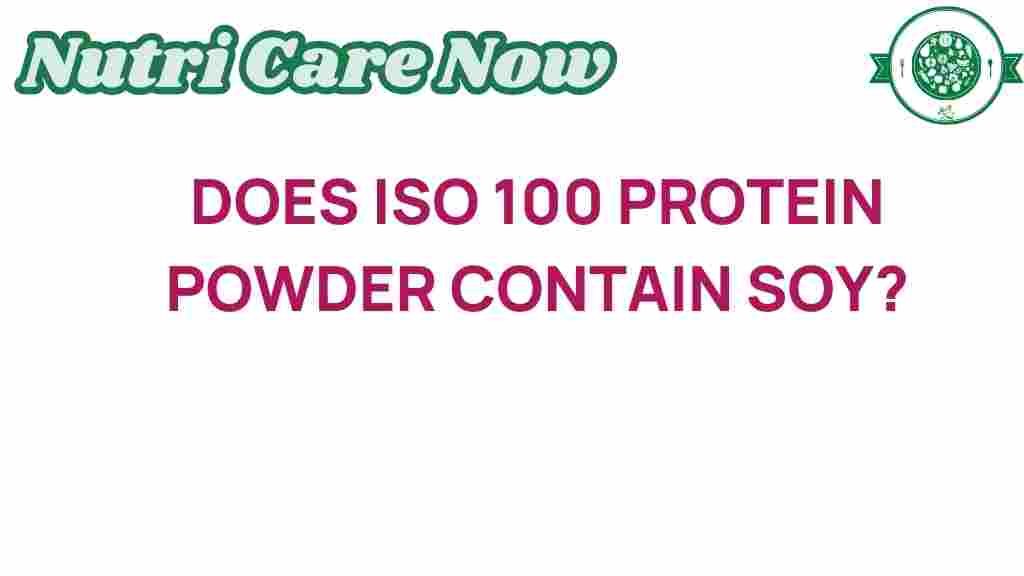Unveiling the Truth: Does ISO 100 Protein Powder Contain Soy?
When it comes to protein supplements, **ISO 100** protein powder has garnered significant attention in the fitness community. Known for its high protein content and rapid absorption, many consumers wonder about its ingredients—particularly whether it contains soy. This article will delve into the composition of ISO 100, addressing dietary concerns, allergens, and its overall health benefits. If you’re a fitness enthusiast or simply someone looking to enhance your nutrition, understanding what goes into your protein powder is crucial.
Understanding ISO 100 Protein Powder
ISO 100 is a popular protein supplement manufactured by Dymatize Nutrition. It is renowned for its hydrolyzed whey protein isolate, which is designed for quick digestion and absorption. Here are some key features of ISO 100:
- High Protein Content: Each serving typically contains around 25 grams of protein.
- Low in Carbohydrates: Ideal for those on low-carb diets.
- Gluten-Free: Suitable for individuals with gluten sensitivities.
- Variety of Flavors: Available in multiple flavors to cater to different taste preferences.
Does ISO 100 Contain Soy?
The primary concern for many consumers revolves around potential allergens, particularly soy. **ISO 100** protein powder is formulated primarily from whey protein isolate, which is derived from milk. Importantly, the manufacturer explicitly states that ISO 100 does not contain soy. However, it’s always essential to check the label for any updates or changes in formulation.
Nutritional Breakdown of ISO 100
To further understand what **ISO 100** offers, let’s take a look at its nutritional profile:
- Calories: Approximately 120 per serving.
- Protein: 25 grams from whey protein isolate.
- Carbohydrates: Less than 1 gram.
- Fat: 0.5 grams.
- Vitamins and Minerals: Contains minimal amounts of calcium and iron.
This profile highlights ISO 100 as an efficient source of protein without unnecessary additives or allergens, making it suitable for various dietary needs.
Dietary Concerns and Health Implications
With the rising awareness of dietary restrictions, it’s essential to consider how ISO 100 fits into various health and nutrition plans:
- For Lactose Intolerant Individuals: While ISO 100 is low in lactose, those with severe lactose intolerance should consult with a healthcare provider.
- For Vegans: ISO 100 is not a vegan product, as it is derived from whey. Vegans should look for plant-based protein powders.
- For Individuals with Allergies: As confirmed, ISO 100 does not contain soy, making it a safer option for those allergic to soy proteins.
The Role of Protein Supplements in Fitness
Protein is a vital macronutrient that plays an essential role in muscle repair and growth. For athletes and fitness enthusiasts, incorporating protein supplements like **ISO 100** can help meet daily protein requirements, especially when dietary intake from food sources is insufficient. Here’s how protein supplements can benefit your fitness regime:
- Muscle Recovery: Protein aids in repairing muscle fibers after intense workouts.
- Convenience: Protein powders provide a quick and easy way to increase protein intake.
- Weight Management: High-protein diets can aid in weight management by promoting satiety.
Step-by-Step Guide to Incorporating ISO 100 into Your Diet
Adding **ISO 100** protein powder to your diet can enhance your protein intake effectively. Here’s a step-by-step guide:
- Assess Your Protein Needs: Determine how much protein you need based on your activity level and fitness goals.
- Choose Your Flavor: Select a flavor of ISO 100 that you enjoy to make consumption more pleasurable.
- Mix it Right: Combine the recommended serving size (usually one scoop) with water, milk, or a smoothie for a delicious shake.
- Timing is Key: Consume your protein shake post-workout for optimal recovery, or as a meal replacement when necessary.
- Monitor Your Intake: Keep track of your overall protein consumption throughout the day to ensure you meet your goals.
Troubleshooting Common Issues with Protein Powders
While using protein supplements like **ISO 100**, you might encounter some common issues. Here are some troubleshooting tips:
- Digestive Discomfort: If you experience bloating or gas, consider starting with a smaller serving size and gradually increasing it.
- Mixability Problems: For a smoother shake, use a blender or shaker bottle to mix your protein powder thoroughly.
- Flavor Fatigue: If you get tired of the same flavor, try alternating flavors or adding ingredients like fruits to your shake.
Conclusion: Making Informed Choices
In summary, **ISO 100** protein powder does not contain soy, making it a suitable option for those with soy allergies. With its excellent protein profile and quick absorption, it can be a valuable addition to your fitness regimen. Always consider your dietary needs and health goals when incorporating supplements into your nutrition plan. For those looking for high-quality protein without allergens, ISO 100 stands out as a reliable choice.
For more information on dietary supplements and their benefits, check out this resource. Remember to consult with a healthcare professional or a registered dietitian if you have specific dietary concerns or health conditions.
With the right knowledge and choices, you can unlock the benefits of protein supplementation while ensuring it aligns with your health and nutrition goals.
This article is in the category Supplements and created by NutriCareNow Team
